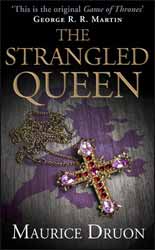|
Click here to return to the main site. Book Review
Phillip IV, the king of France, is dead. He is succeeded by his son Louis X, a weak and emotionally unstable youth whose wife, Marguerite, still languishes in the Chateau Gaillard for her infidelity. The new king denounces his only child as a bastard believing her to be the product of his wife’s liaison with another. Both the King and the Kingdom need a queen and an heir, but nothing can happen whilst Marguerite still lives. When she turns down an offer which would guarantee her life she set off a power struggle between the two most powerful factions in the kingdom for the king’s heart and the throne... The Strangled Queen (Les Rois Maudits) by Maurice Druon is a well-respected historical drama, written by an author who was a member of the French resistance, Knight of the British Empire and the holder of the Grand Croix de la Legion Fancaise. His literary work also gained him admission to the prestigious L’Academie Francaise. Although based on real events, and exhaustive research, some of the elements have been tweaked for dramatic purposes. It’s not quite a bodice ripper, which only uses the period as background scenery, nor is it a historical text book, it has more in common with the historical traditions of the ancient Greek and Romans, where interpretation was as important as fact. With a title like that we know things are not going to end well for Marguerite. The book has a forward by contemporary fantasy superstar George R. R. Martin (Game of Thrones) extolling the virtues of the book and for once these are deserved. Martin once said that Thrones was just a history of a place which never existed, history itself is as bloody and violent, if not more so, as anything Martin has produced and if this series allows readers to bridge the gap between fantasy and actual history then it would have done a great justice to its readership. When Phillip IV dies, the country which he has held together is left in the inexperienced hands of his son, whose only concern is getting rid of his wife and marrying Clementia of Hungary. The king is headstrong and stubborn, hence he was known as le Hutin. His inexperience starts a political war for control between Enguerrand de Marigny, the Grand Chamberlain of France and Charles of Valois, which threatens to end in the death of one or both of the men. The book is translated, from the French, by Humphrey Hare and although this is a new publication the language can seem a little archaic at times, but this is keeping with a book set in 1315. The series, as a whole, is well worth picking up as it tells the tale of the kings of France with all their political machinations, violence and sex; you can see why Martin likes them. 8 Charles Packer |
|---|


